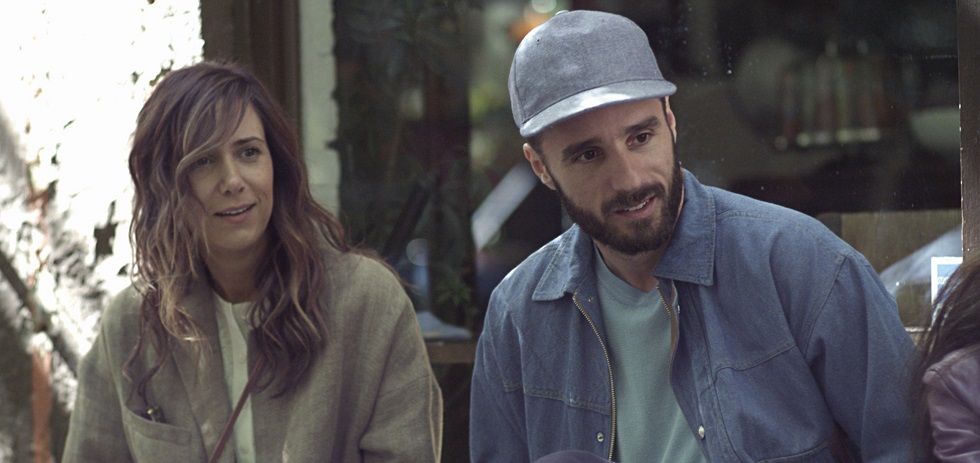
Following his previous Sundance double debut of Crystal Fairy & the Magical Cactus and Magic Magic (both starring Michael Cera) in 2013, Chilean writer/director Sebastián Silva has returned with the very understated and well constructed, if occasionally sloppy, Nasty Baby. For me, the slight, tense weirdness of Magic Magic failed to launch, but thankfully Nasty Baby tackles what little common ground the two share with ease and delivers a wholly entertaining mumblecore-influenced experience that is only minimally stunted by its unconventional third act. It’s an act that the film could have done without, although without it Nasty Baby would not be the experience that Silva wanted to create. As it stands, Nasty Baby is a great little experiment that’s sure to cause a lot of debate in the festival circuit.
The film follows Freddy (Silva) and Mo (Tunde Adebimpe of TV on the Radio fame), a gay couple who seek to father a child with their friend Polly (Kristen Wiig). Unfortunately Freddy is virtually infertile and Mo feels weird about contributing his own genetic material to the process. While this plotline joins together all the disparate elements in play, it’s not the only thing going on here. Freddy and Mo also deal with a mentally ill homophobic neighbour, the construction of an art project, and just generally living life as an upper-class, creative, well-educated New York couple. Attempting to describe the film’s plot is futile; whatever you could possibly say feels like a misrepresentation. Nasty Baby, or at least the first three quarters of it, focuses on accurately portraying everyday life and the mundane nature of reality, mixing in an underlying critique of gentrification for good measure.
Wrapping around this perversely constructed plot are great opening and closing credits sequences with fantastic, pumping music cues and ultra-proficient editing. They are a sharp diversion from the rest of the film, which is (intentionally) far less polished and mumblecore-y, with soundtrack only under sequences in which characters are listening to music and editing that is far less abrupt and noticeable. It’s very naturalistic in its construction that, along with some great performances and improvised dialogue,1 aids the notion of normality and reality that the plot strives for.
Something that would have comprised the focus of a lesser film and been played for ‘look out how weird and wacky this is’ laughs like surrogacy is here treated with a level of respect and mundanity. The eventual portrayal of the process of artificial insemination is neither clinical nor quirky, an intimate and natural process shared between two lovers and their best friend. It’s almost as though Silva is attempting to destigmatize and normalize a process that has (up until this point) only been treated as a plot quirk in films like The Brothers Solomon and Baby Mama. The Brothers Solomon comparison is apt as Kristen Wiig also played the surrogate mother in that production – it is almost as though she is attempting to atone for past sins here reprising the role but not playing it for laughs. It’s very telling that the only overtly homophobic character here is mentally ill – it’s the 21st century and society’s values have shifted: It’s normal for two people who love each other, regardless of sexual orientation, to have a shot at raising a child, and displays of homophobia are now attributed to those who live on the fringes (and rightfully so).
Without getting into spoiler territory the third act toys with some notion of homosexual guilt and a few common thematic threads of Silva’s previous outings, marking a very clear diversion from the moments that came before it. I’ve read a lot of criticism of this abrupt tonal shift and honestly, I think a lot of it is unfounded. While the film would work better if it stuck to its more mumblecore-y trajectory, Silva’s conclusion leaves you with something to mull over long after you’ve left the cinema. To its credit, it feels as though there are clear answers to this section’s meaning, Silva just doesn’t want to make them overtly obvious so you can bring your own personal interpretation to the table. It’s an economically irresponsible move as I could see this garnering a much higher level of crossover success as a conventionally slight indie flick. In saying this, I respect his decision to end the film in this manner as it feels very personal and akin to themes explored in the rest of his filmography, a decision that may reap long-term rewards.
All in all, Nasty Baby is an impressive and unique effort that is sure to polarise audiences and critics alike. The cast turn in fantastic performances across the board and Silva’s vision feels almost totally realised. If not for a few hokey scenes here and there and the fact that the film fails to totally stick the landing this would almost be a shoe-in for my best of the fest however, in its current form, it doesn’t quite make the cut. Going into this I wasn’t totally convinced of Silva’s talent, but after seeing Nasty Baby you can consider me a convert.
Around the Staff
| Luke Goodsell | |
| Jeremy Elphick | |
| Jess Ellicott | |
